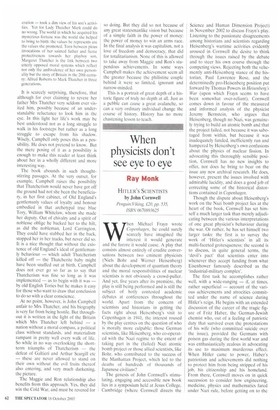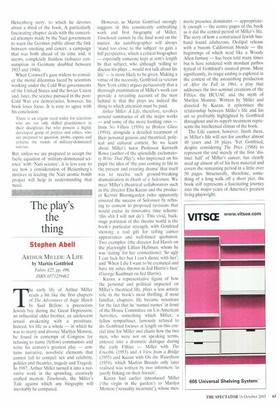When physicists don't see eye to eye
Ray Monk
HITLER'S SCIENTISTS by John Cornwell Penguin/Viking, £20, pp. 535, ISBN 0670893625 When Michael Frayn wrote Copenhagen, he could surely scarcely have imagined the interest it would generate and the furore it would cause. A play that consists almost entirely of erudite conversations between two eminent physicists (Niels Bohr and Werner Heisenberg) about the development of quantum theory and the moral responsibilities of nuclear scientists is not obviously a crowd-puller. And yet, five years after its premiere, the play is still being performed and is still the subject of hotly contested academic debates at conferences throughout the world. Apart from the concern of scientists and historians in getting the facts right about Heisenberg's visit to Copenhagen in 1941, the interest roused by the play centres on the question of who is morally more culpable: those German scientists, like Heisenberg, who co-operated with the Nazi regime to the extent of taking part in the (failed) Nazi atomic bomb project or those allied scientists, like Bohr, who contributed to the success of the Manhattan Project, which led to the deaths of hundreds of thousands of Japanese civilians?
The genesis of John Cornwell's stimulating, engaging and accessible new book lies in a symposium held at Jesus College, Cambridge (where Cornwell directs the
Science and Human Dimension Project) in November 2002 to discuss Frayn's play. Listening to the passionate disagreements among historians and scientists regarding Heisenberg's wartime activities evidently aroused in Cornwell the desire to think through the issues raised by the debate and to steer his own course through the competing views. Rejecting both the vehemently anti-Heisenberg stance of the historian, Paul Lawrence Rose, and the determinedly pro-Heisenberg position put forward by Thomas Powers in Heisenberg's War (upon which Frayn seems to have been somewhat over-reliant), Cornwell comes down in favour of the measured and informed analysis of the physicist Jeremy Bernstein, who argues that Heisenberg, though no Nazi, was genuinely trying to build an atomic bomb and that the project failed, not because it was sabotaged from within, but because it was inadequately funded, inefficiently run and hampered by Heisenberg's own confusions about the physics of nuclear fission. In advocating this thoroughly sensible position, Cornwell has no new insights to offer, nor does he bring to bear on the issue any new archival research. He does, however, present the issues involved with admirable lucidity, and does a good job of correcting some of the historical distortions contained in Copenhagen.
Though the dispute about Heisenberg's work on the Nazi bomb project lies at the heart of the book, Cornwell has set himself a much larger task than merely adjudicating between the various interpretations of one great physicist's behaviour during the war. Or rather, he has set himself two larger tasks: the first is to survey the work of 'Hitler's scientists' in all its multi-faceted grotesqueness; the second is to discuss, in quite general terms, the 'devil's pact' that scientists enter into whenever they accept funding from what Eisenhower famously described as the 'industrial-military complex'.
The first task he accomplishes rather well, with a wide-ranging — if, at times, rather superficial — account of the various achievements and atrocities committed under the name of science during Hitler's reign. He begins with an extended discussion of the career of the tragic figure of Fritz Haber, the German-Jewish chemist who, out of a feeling of patriotic duty that survived even the protestations of his wife (who committed suicide over the issue), provided the Germans with poison gas during the first world war and was enthusiastically zealous in advocating its use to maximum murderous effect. When Hitler came to power, Haber's patriotism and achievements did nothing to protect him from being stripped of his job, his citizenship and his homeland. From there, Cornwell moves on in quick succession to consider how engineering, medicine, physics and mathematics fared under Nazi rule, before getting on to the Heisenberg story, to which he devotes about a third of the book. A particularly fascinating chapter deals with the concerted attempts made by the Nazi government to warn the German public about the link between smoking and cancer, a campaign that was both ahead of its time and, it seems, completely fruitless (tobacco consumption in Germany doubled between 1933 and 1940).
When Cornwell's gaze widens to consider the moral dilemmas faced by scientists working under the Cold War governments of the United States and the Soviet Union and, later, the science pursued in the postCold War era democracies, however, his book loses focus. It is easy to agree with his conclusion:
There is an urgent need today for scientists who are not only skilled practitioners in their disciplines but who possess a highly developed grasp of politics and ethics, who arc prepared to question, probe, expose and criticise the trends of military-dominated science.
But, unless we are prepared to accept the facile equation of 'military-dominated science' with 'Nazi science', it is less easy to see how a consideration of Heisenberg's motives in leading the Nazi atomic bomb project will help in understanding that need.



































































































 Previous page
Previous page